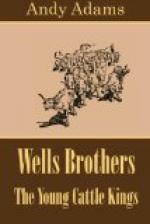The trail foreman spent a pleasant two weeks at the Wells ranch. After the corn was in store, the trio rode the range and reviewed every possible line of defense. Since the winter could not be foreseen, the only safe course was to anticipate the worst, and barring the burning of the range from unseen sources, the new ranch stood prepared to withstand a winter siege. Everything to forefend against a day of stress or trial had been done, even to instilling courage into youthful hearts.
“There’s only one thing further that comes to mind,” said the practical man, as they rode homeward, “and that is to face an unexpected storm. If a change of weather threatens, point your herd to meet it, and then if you are caught out, you will have the storm in your back to drift the cattle home. Shepherds practice that rule, and the same applies to cattle under herd.”
All horses were to be left at the new ranch for the winter. Dell volunteered to accompany their guest to the railroad and bring back the extra mount, thus leaving five of Lovell’s horses in possession of the boys. On the day of departure, at breakfast, after a final summary of the lines of resistance, the trio dallied about the table, the trail foreman seemingly reluctant to leave.
“It’s a common remark among us drovers,” said Priest, toying with his coffee cup, “that a cowman is supposed to do his sleeping in the winter. But the next few months you boys must reverse that rule. Not that you need to deny yourselves abundant rest, but your vigilance should never sleep. Let your concern for the herd be the first and last thought of the day, and then I’ll get my beauty sleep this winter. The unforeseen may happen; but I want you to remember that when storms howl the loudest, your Mr. Quince and I will be right around the bend of the creek, with our ear to the ground, the reserves, listening to the good fight you boys are making. Of course you could call the reserves, but you want the glory of the good fighting and the lust of victory, all to yourselves. That’s the way I’ve got you sized up—die rather than show the white feather. Come on, Dell; we’re sleeping in the summer.”
CHAPTER IX
A WINTRY CRUCIBLE
The dreaded winter was at hand. Scarcely a day passed but the harbingers of air and sky sounded the warning approach of the forthcoming siege. Great flights of song and game birds, in their migration southward, lent an accent as they twittered by or honked in mid-air, while scurrying clouds and squally weather bore witness of approaching winter.
The tent was struck and stored away. The extra saddle stock was freed for the winter, and located around Hackberry Grove. The three best horses were given a ration of corn, and on Dell’s return from the railroad, the cattle were put under herd. The most liberal freedom must be allowed; with the numbers on hand, the term close herding would imply grazing the cattle on a section of land, while loose herding would mean four or five times that acreage. New routes must be taken daily; the weather would govern the compactness and course of the herd, while a radius of five miles from the corral was a liberal range.




